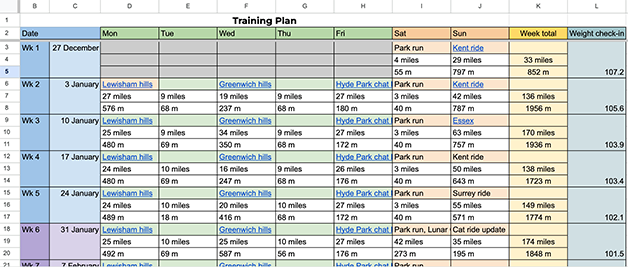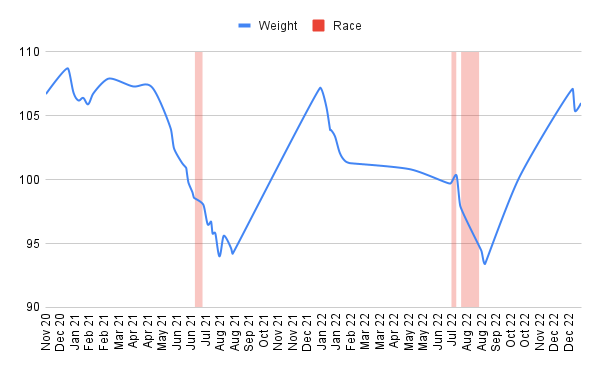Winter miles, summer smiles
Having done a few races I've learned that it really helps to have a proper training plan, so that when the race starts it doesn’t come as a shock to the body, and the cycling element of the race is just ‘business as usual’. When I’ve put in adequate training, I’ve had no major injuries during the race. Here’s a brief run down of what I've found works well for me.
With a race date in July, training begins in January. For the past couple of years, I’ve set up a spreadsheet as a training calendar, entering my planned training days as well any upcoming cycling events I want to do. I believe this helps in not only formalising a methodical ramped approach, but it also promotes curiosity in progress, which in itself helps with motivation. A typical week at the beginning of training is about 150 miles of cycling with 1,800 m climbing, and looks like this:
| Monday | Medium hills + commute |
| Tuesday | Easy ride (i.e. just commuting to work) |
| Wednesday | Light hills + commute |
| Thursday | Easy ride (i.e. just commuting to work) |
| Friday | Slightly longer ride (extra 1-2 hours added to the commute) |
| Saturday | parkrun (5km run) |
| Sunday | Longer Sunday ride in the countryside / social club ride |
I created a spreadsheet that pulls in the summary data of my training rides from Strava. This lets me see how my progress matches up with my intentions as the weeks progress:

The training ramps up over time in terms of volume and intensity. I do more miles and more hills, and start attacking them more aggressively. But it always depends on how I’m feeling on the day. I also usually have a bunch of luggage on my bike. If I’m training in the morning and I’m on the way to work I might have a couple of laptops in my bag and a change of clothes. The heavier the bike for training, the better!
The aim is to be in a place where I can cycle my bike for all the hours I’m awake, and with good training, I will tire less and improve my overall average speed. The amount of training required isn’t so much a fitness regime, as a lifestyle change.
The long weekend ride gets longer as the months progress. I throw in some quite long rides just to see if I have any issues with the bike or my comfort. What improvements can I make? I do a few century+ rides in spring. For the past couple of years I’ve done Islington’s ‘Great Escape’ audax ride in May. Ordinarily a 110 mile audax, I’ve done ‘two laps’ of this the past couple of years. I start 12 hours before the official start to do an overnight ride of the course, then I’m back at the start when everyone else is at the start and do another lap. By the time I get home I’ve ridden about 275 miles. Usually the night lap is way more interesting than the day loop - I highly recommend it.
Other long rides in the build up to the Transcontinental race included riding the ‘Cantii Way’ route on the day it was published, riding 100 miles of Regents Park’s inner circle, and riding 200 km of Regents Park’s inner circle (better than it sounds, as there’s always a lot going on, no traffic lights, and each lap offers the opportunity for a coffee stop, water top up, food stop, or comfort break).
In the 2-3 months immediately prior to the Transcontinental I didn’t train as much as I would have liked, but I was still getting the miles in and doing hill training.
I started tapering my training about 2-3 weeks before the Pan Celtic Race, which is a technique I learned a few years ago whilst training for a running marathon. It’s nice to relax a bit and not feel guilty about it.
Weight
One of the easiest ways to make a real difference in performance is drop a bit of weight. For the past couple of years I’ve embarked on a weight-loss regime ahead of races. With the motivation of an upcoming race, I’ve found it surprisingly easy to do, and for me that’s the key thing, as without motivation it simply doesn’t happen!
My technique is essentially just to fast from dinner to lunch from Monday to Friday. I do exercise in the morning and skip breakfast, and instead just drink a few cups of coffee until lunch. At lunchtime I have two scoops of Huel shake (salted caramel black edition). If I am still feeling hungry in the afternoon I might have an energy bar. In the evening I eat as per normal without worrying about it - essentially just whatever I fancy. I eat a pescatarian diet. Weekends are also as per normal.

By this fasting method (and exercising), I find I lose on average 0.1 kg per day, or 3.3 kg / 7 lbs per month.
As for the very sharp uptick each year in Autumn / Winter, I believe that’s due to an increase in cheese and biscuits, and the advent of lebkuchen season ;)